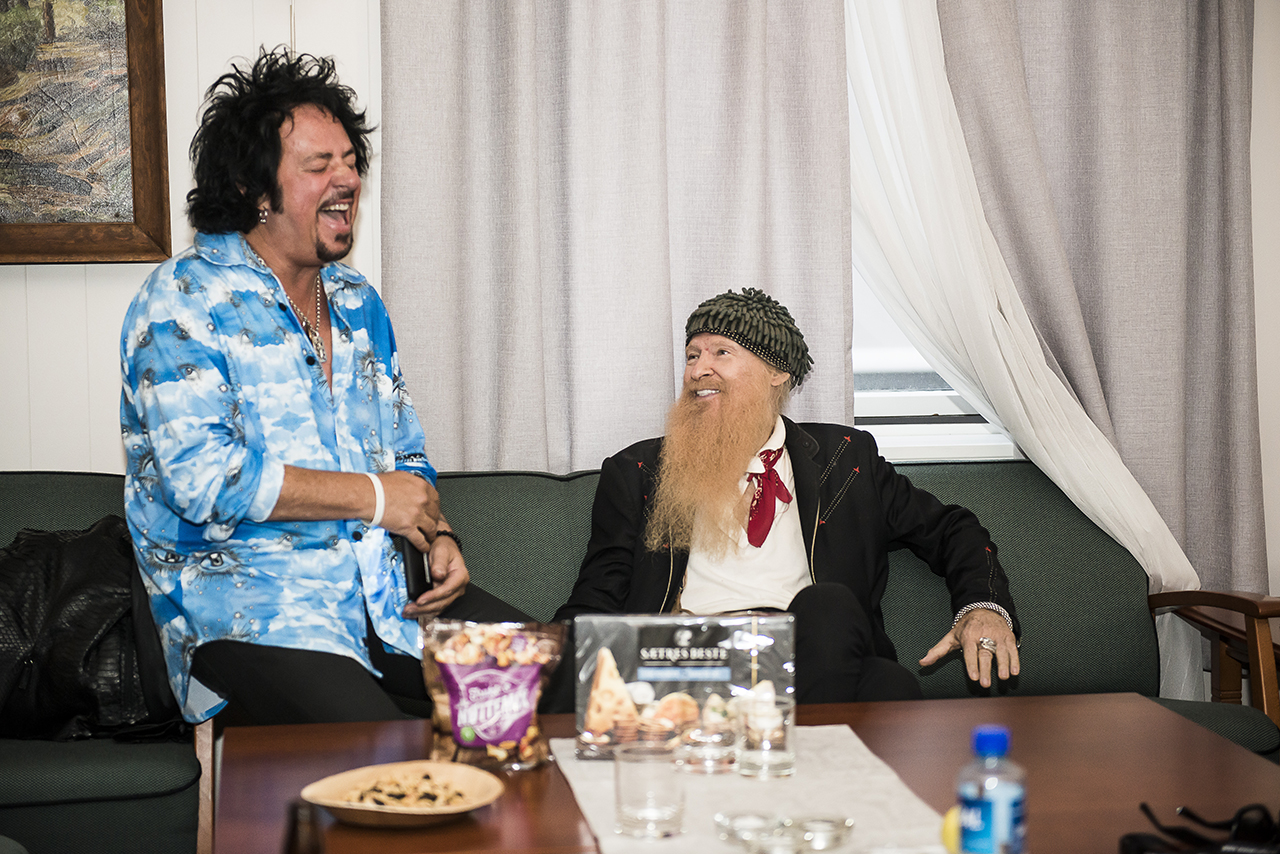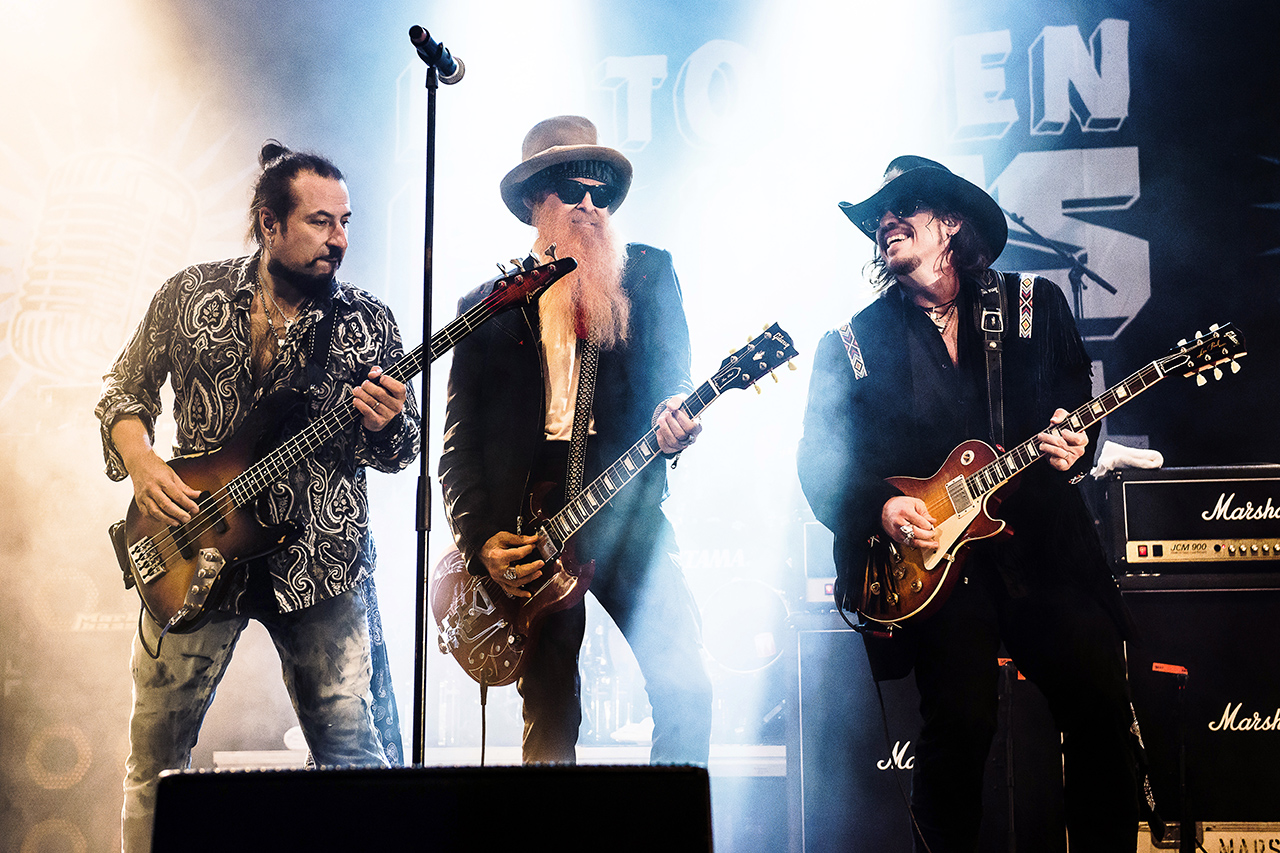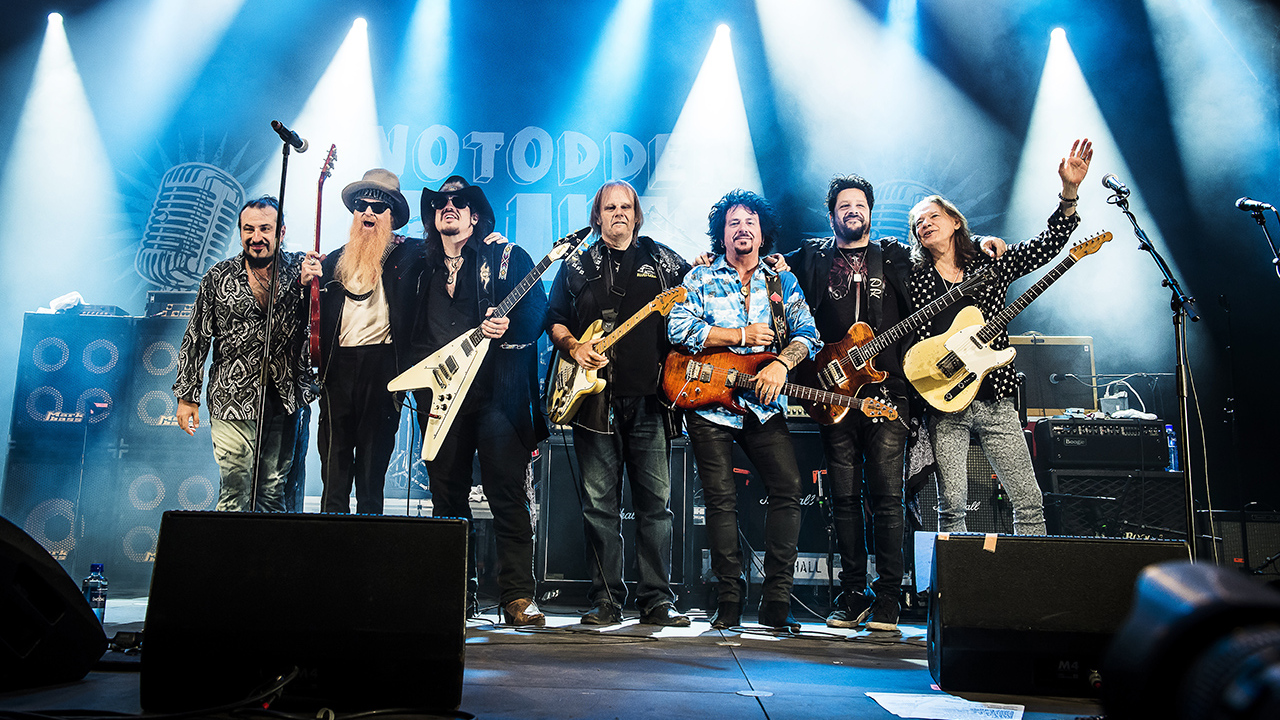Two Jews and a Native American walk into a bar… No, that isn’t the opening line of a joke, it’s what happened on the Saturday night at Notodden Blues Festval, two hours outside of Oslo. There probably are contemporary exponents of blues rock and boogie who do adhere to the ancient stereotype of shit-kickin’ redneck Caucasian good ol’ boys, but the core members of Supersonic Blues Machine aren’t three of them. Those three are bassist Fabrizio Grossi, an Italian-Jewish New Yorker, drummer Kenny Aronoff of Russian-Jewish descent, and singer-guitarist Lance Lopez who is of Native American heritage, from Texas via Wales. “We’re all part of the United Nations, and you either belong or you don’t,” Grossi decides in the lounge bar of a hotel opposite the entrance to the festival.
Lopez, at 38 the baby of the band, is every inch the laconic cowboy with his stetson and Texan drawl.
“We’re bringing together all these different guitar players and musicians from everywhere. It symbolises unity on a broad front,” he offers.
Grossi is so animated that his ponytail flaps about as he speaks. The lynchpin of the Supersonic Blues Machine operation, he talks in italics and capitals, his every pronouncement an exclamation of surprise.
“It’s crazy,” he says of his band’s headline slot at Notodden, which is only their second-ever gig, not counting the trio’s many years as sidemen and session players. “It’s insane. Ridiculous. Who’d have thought Norway would be a cradle of the blues? But the knowledge and the passion of the people here is incredible. How the fuck is that possible? Maybe because the world is so connected.”
He stops for a moment, then his eyes light up. “I wouldn’t be surprised if the next blues explosion came from North Korea!” he exclaims.
That country’s head honcho Kim Jong-un rocking out to Bone Bucket Blues and Running Whiskey? Stranger things have happened. Still, you can forgive Grossi’s excitement. After all, look who he’s managed to sign up to play at tonight’s show, which he envisions as a touring version of The Rolling Stones’ Rock And Roll Circus. As he says: “I want it to be like the late sixties/early seventies, with lots of jamming among friends. It’s like, instead of staying home and playing pool let’s go on the road and make some noise.’”
Milling about in the lounge bar are guitarists Walter Trout and Robben Ford. Huddled in a corner are Steve Lukather of Toto and Billy Gibbons of ZZ Top. It’s like an issue of Classic Rock brought to life: respectively, a blues great, one of Musician magazine’s 100 Greatest Guitarists Of The 20th Century, one of the top 10 session guitarists of all time according to the Gibson Guitar Corporation, and the man that Jimi Hendrix famously deemed to be his superior on the instrument.

Grossi can hardly believe his luck.“I’m excited and nervous at the same time,” he says of tonight’s show, which is due to start in 20 minutes.
If you want “insane” and “ridiculous”, you should see Grossi’s psychedelically patterned shirt, which is so bright you’ve gotta wear shades. In fact, despite the overcast skies, Kenny Aronoff is doing exactly that – the bald, 63-year-old drummer looks not unlike the late Ed Cassidy of Spirit. Aronoff (whose forthcoming autobiography Sex, Drums, Rock ‘N’ Roll! The Hardest Hitting Man In Show Business will detail his exploits as one of rock’s most prolific drummers for hire, whose impressive credits include the Stones, Elton John and Bob Dylan)matches Grossi for wired intensity.
“I’m not just a drummer, I’m a problem solver,” he gabbles, starting a monologue that threatens to take him right up to showtime and beyond. “I always know what’s going on. I make it look loose and spontaneous, but I tell you, I have every note written out, every drum-crash, cymbal and hi-hat. I’m famous for being the most anal chart writer in the world. I play with symphony orchestras: classical, jazz-fusion, blues. I’ve worked hard to be this well-rounded. I went to the number-one music school in America [the Indiana University School of Music], where if you didn’t work hard you’d get thrown out. [2014 movie] Whiplash? We had teachers like that. They’d make you shit in your pants. I saw guys have nervous breakdowns. They prepared you to be the best motherfucker out there.”
Phew. Pause for breath. But not for long because here come Grossi and Lopez, talking about how “unpredictable”, even “dangerous” it is playing with Supersonic Blues Machine.
“It’s a major pain in the ass,” Grossi says of the impromptu nature of their live performances, “but it’s also fun. If you want something good-sounding, with good arrangements, listen to the record.”
SBM are steeped in the blues, but it’s an extrapolation of the form, just as Led Zeppelin and the Stones took the genre to new places. And like their Brit-blues forebears, they have dallied on the dark side.
“I’m done with that shit,” Grossi, shuffling nervously on the couch, says of his dabbling with black magic as a kid. “That’s why I wrote I Ain’t Fallin’ Again [from 2016 debut album West of Flushing, South Of Frisco]. I ain’t going back there.”
He recalls that while using a ouija board he had a premonition of the death of his mother, which happened when he was 12.
“That was a major freak-out,” he says. “Then after that things started happening around the house – weird things.” He quotes a young blues artist he’s been producing: “If you want to get found, you need to get lost.” Then he surveys the hotel bar and its numerous musicians, many of whom have danced with the devil. “Look at all the people in this room,” Grossi demands. “If you put together everything bad that happened to them, you could tear down the whole town.”
Supersonic Blues Machine go some way towards tearing down this corner of Norway with their set tonight. Several thousand people, including Finland’s Blues News magazine (who knew?), have made their way in the driving rain to this remote location to see the world’s premier electric blues supergroup. And they are quite a sight: a stardust cowboy who flies like an Eagle; sartorially speaking, an Italian-American pimp from a Scorsese movie set in 1975; a Right Said Fred lookalike; plus “heady fwends”: Messrs Lukather, Gibbons, Ford and Trout take it in turns to offer their own take on the blues.
As though to confirm their status as descendants of a proud blues-rock tradition, SBM open with The Doors’ Roadhouse Blues. Then on I Ain’t Fallin’ Again they confront their demons, and on Remedy they find a cure for their addictions.
Trout makes the first cameo appearance, the giant screen at the side of the stage showing Atlanta City’s finest straining his every sinew to convincingly sing and play the blues. The soulful and virtuosic Say Goodbye To The Blues is dedicated to “the greatest bluesman of all time, BB King,” who the recovering axeman met “when I was a kid – he inspired me and put me on this path”. As far as Lance Lopez is concerned, he could be taking about himself, with Trout the object of his affections. He gazes in awe at his hero’s climactic weeping solo, squinting his eyes because he can’t believe what he’s seeing, let alone hearing. Trout, who appears to have lived several lives, manages to stay on stage for a second song, Can’t Take It No More, a slow, grinding number sung by him and Lopez. Trout’s face in particular is a rictus of painful experience as he assails his fretboard and rasps his woes.
Next is Ford, introduced by Lopez as “one of my biggest heroes” ahead of Let It Be (the SBM one, not the Beatles one), an elegiacal dirge that allows Ford to execute a perfectly judged solo. He stays for a funkily fine rendition of Zeppelin’s Trampled Underfoot, complete with what sounds like a clavinet playing the opening riff and a sense of dastardly menace to rival the original, even if Lopez can’t quite equal Robert Plant’s lupine howl.

For Watchagonnado Lukather is welcomed, all floral shirt, leather pants and jet-black pompadour. He performs the song with an orgiastic grimace and his shredding is among the most impressive of the night.He remains for the amplified blues of Freedom and Bridge Of Sighs, for which he also does a lot of the heavy lifting, and the latter’s extemporising without a net sends the audience into raptures.
Following a gritty Ain’t No Love In The Heart Of The City, dispensed by Lopez with his Flying V, Gibbons the starriest guest of all – all beard, cap and shades – storms through La Grange, which Grossi calls “Texas’s national anthem”. As ever, Gibbons cuts an artily ironic figure among such unreconstructed company, even as he holds up his guitar and jokily shreds with one hand. “We have to do this one,” he says ahead of Sharp Dressed Man, a song by that other supersonic blues machine, ZZ Top.
Finally, Gibbons joins in for Running Whiskey (the song that launched SBM), and there’s an encore of Freddie King’s Going Down featuring all the players at once. A magnificent seven guitarists, if you count Grossi (and you should), line up at the front of the stage for an all-star jam and individual electric – and electrifying – solos, from the bluesy to the frankly metallic.
Back at the hotel lounge bar, a clearly exhilarated and emotional Lukather wonders: “Did we just set a world record of badass guitar players in different styles standing next to each other on a stage and digging each other?”
Grossi, meanwhile, was bedazzled by the vision of youthful loveliness he witnessed from the stage. “I love it
when concerts aren’t a sausage party,” he enthuses, delighted that SBM’s fan base doesn’t comprise only superannuated guitar-heads. “Down the front they were really digging it, all these girls dancing.”
Asked to name a set highlight, he draws a blank – mainly because it was one long highlight. “It was just ‘Wooooaaahh’,” he says, using his hand to mime the upwards trajectory of a fighter plane. “It was like a fucking jet taking off.”
Perhaps understandably there was, notwithstanding the mutual respect, a spirit of healthy competition.
“Yes,” Grossi agrees, “but not like, ‘Oh, I wanna kill you!’”
Was Lopez intimidated, playing alongside some of his heroes?
“No, honoured,” he replies. “These are the greatest guitar players in the world.”
Lukather enjoyed flexing his guitar muscles in such esteemed company. “Sometimes it’s good to play soft,” he says, “and other times you step on the gas a bit – especially when a girl smiles at you, then suddenly you’re like this [mimes rapid shredding]. All guitar players like to throw down a little bit.”
As do drummers.
“I used to practise eight hours a day, learning how to play simple,” Aronoff says, attacking the backstage cheese and crackers with the relish he attacks his drums. Through munches, he recalls his early role model. “I originally tried to be Billy Cobham – he’s a friend of mine. I’ve told him: ‘You almost fucked up my career.’ Ringo Starr and Charlie Watts saved my career. Then I became a rock star, with big Number-One hit records, all over MTV, playing clubs and stadiums… I’d have a bottle of champagne in one hand and two girls in the other… My glass used to be half-empty, but now I know the glass is always half-full.”
Walter Trout, too, is buzzing from the gig.
“It was fuckin’ awesome,” he declares to Aronoff, talking like a paratrooper who’s just leaped out of a plane over ’Nam. “It gave me a shot of adrenalin, man, and I jumped right off.”
He hugs Aronoff before heading back to his hotel for three hours’ sleep ahead of tomorrow morning’s early return flight to the States.
Gibbons – who the others all defer to and call “the conductor” – is also calling it a night.
“That,” he says of the show, “was really rockin’, on a number of levels. When you get a load of guitarists this talented it really makes for an interesting presentation. Can you believe it – six guitar players? It was like a kick in the butt, kinda: ‘You better do it now!’”
Amid all the happy banter, there’s a reminder of SBM’s authentic blues backgrounds.
“Fab and I have both been through some very dark times,” Lopez reveals. “I’ve recovered from drug addiction, which was really difficult to come out of, and Fab was one of the key figures who helped me survive it. And then Fab had major health problems…”
“It was stress-related,” Grossi picks up. “I’m fine, but… Listen. For most bands in the seventies or eighties our first album would probably have been their tenth record,” he adds. “We went through two divorces, one bankruptcy, a near-death experience, childbirth, rehab… It’s a VH1 Behind The Music documentary.”
“We know how to tap into the darkness,” Lopez advises, his eyes peeking out from beneath the rim of his stetson. “It’s like BB King said: ‘You don’t have to live the blues to sing the blues… but it sure helps.’”

